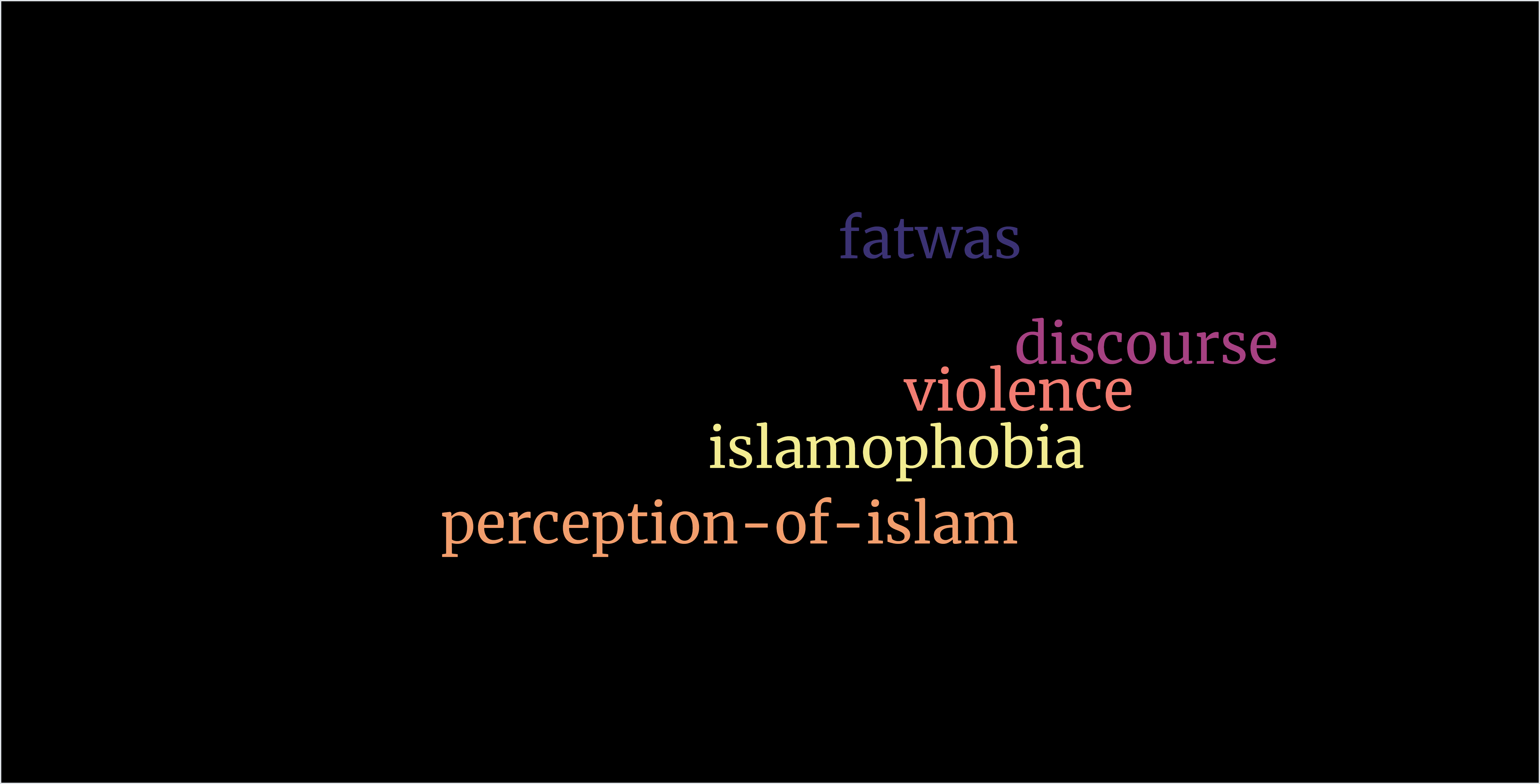Islamophobia and the Spoils of Violent Fatwas
Abstract
 Abstract Views: 0
Abstract Views: 0
The current research aimed to examine the key manifestations of violent fatwas, particularly those that incite bloodshed, within the context of Arab-Islamic culture. These fatwas are categorized into two types. The first type comprises institutional fatwas, issued by official religious institutions or individuals who represent states in their capacity as political leaders or as figures combining political and religious authority. These two types of fatwas take two directions: they target individuals abroad or at home, including their own countries and leaders, or foreign countries. The research highlighted how fatwas advocating bloodshed in both categories are often co-opted by those who fear Islam to fuel Islamophobia, portraying all Muslims as violent and terrorists without acknowledging that Muslims are not a monolithic group. Among Muslims are those who condemn such fatwas, as well as those who fall victim to them. The study demonstrated that these generalizations obscure the diversity within Islamic culture and serve as tools for anti-Muslim propaganda. Furthermore, the study aimed to establish that fatwas contributing to the stigmatization of Islam and Muslims as violent both serve as spoils and create a predicament. They provoke angry and accusatory reactions towards Muslims, causing their concerns to be consistently framed by rulings that diminish their significance. Fatwas sanctioning the taking of life are presented as evidence of hatred and violence, fuelling mobilization against these matters—even when they are merely issues.
Downloads
References
Abdel-Hafeez, Sabri. “Ulamā' wa Dār al-Iftā': Fatāwā Ihdār al-Damm Siyasiyyah.” [Scholars and the Fatwa House: Fatwas on the Bloodshed are Political]. Elaph, May 17, 2015. https://elaph.com/Web/News/2015/5/1010127.html.
Abisaab, Rula Jurdi. “Deconstructing the Modular and the Authentic: Husayn Muroeh’s Early Islamic History.” Critique: Critical Middle Eastern Studies 17, no. 3 (2008): 239–59. https://doi.org/10.1080/10669920802405449.
Arkoun, Mohammed. De Manhattan à Bagdad: Au-delà du Bien et du Mal (From Manhattan to Baghdad: Beyond Good and Evil). Paris: Desclée de Brouwer, 2013.
El-Banna, Jamal. Kallā Thumma Kallā [No, Still No!]. Cairo: Dar Al-Fikr Al-Islami, 1994.
Cosentino, Gabriele. “What the Stabbing of a Nobel Prize-Winning Novelist Tells Us About Power in Egypt.” New Lines Magazine, December 6, 2024. https://newlinesmag.com/essays/what-the-stabbing-of-a-nobel-prize-winning-novelist-tells-us-about-power-in-egypt/
Crépon, Marc. L'Imposture du choc des civilisations [The Deception of the Clash of Civilizations]. Nantes: Éditions Pleins Feux, 2002.
Del Valle, Alexander. Le Totalitarisme Islamiste à l'assaut des démocraties [Islamist Totalitarianism's Assault on Democracies]. Paris: Syrtes, 2002.
Eyerman, Ron. The Assassination of Theo van Gogh: From Social Drama to Cultural Trauma (Politics, History, and Culture). Durham: Duke University Press Books, 2008.
Fallaci, Oriana. The Rage and the Pride. New York: Rizzoli, 2001.
Foucault, Michel. Nizām al-Khitāb [The Archaeology of Knowledge]. Translated by Mohamed Sbila. Morocco: Dar Al-Tanweer, n.d.
Fukuyama, Francis. “Rewriting History and Focusing on the Danger of Muslims in Europe.” Washington Report on Middle East Affairs 35 (December 2005).
Guinness, Emma. “What is a Fatwa and Why Did Iran Issue One Against Salman Rushdie for The Satanic Verses in 1989? It Was Only After the Fatwa Was Lifted by Iran in 1998 That He Was Willing to Be Seen in Public Again.” The Independent, April 15, 2024. https://www.independent.co.uk/arts-entertainment/books/news/salman-rushdie-fatwa-santanic-verses-knife-b2528749.html.
Habermas, Jürgen. The Structural Transformation of the Public Sphere. Translated by Thomas Burger and Frederick Lawrence. Cambridge: MIT Press, 1990.
Huntington, Samuel P. The Clash of Civilizations and the Remaking of World Order. New York: Simon and Schuster, 1996.
Al-Khunein, Abdullah ibn Muhammad ibn Said. Al-Fatwa fi al-Shari'ah al-Islamiyyah [Fatwas in Islamic Law]. 1st ed. Riyadh: Al-Obeikan Library, 2017.
Lewis, Bernard. “The Roots of Muslim Rage: Why So Many Muslims Deeply Resent the West, and Why Their Bitterness Will Not Easily Be Mollified.” The Atlantic Monthly, September 1990, https://balkansbg.eu/en/content/library/587-the-roots-of-muslim-rage.html
—. Le Langage politique de l'Islam [The Political Language of Islam]. Translated by Odette Guitard. Paris: Gallimard, 1998.
—. L'Islam en crise [Islam in Crisis]. Paris: Gallimard, 2003.
Lormier, Dominique. La dérive intégriste : chrétiens, juifs et musulmans face au fondamentalisme [The Fundamentalist Drift: Christians, Jews, and Muslims Confronting Fundamentalism]. Paris: Acropole, 2007.
Oweidat, Nadia. Reform and Its Perils in Contemporary Islam: The Case of Nasr Hamid Abu Zayd. Oxford: Oxford University Press, 2024.
Ramonet, Ignacio. Géopolitique du chaos [Geopolitics of Chaos]. 2nd ed. Paris: Gallimard, 2002.
Senghaas, Dieter T. Al-Ṣadām Dākhil al-Ḥaḍārah: al-Tafāhum Bishān al-Ṣirā'āt al-Thaqāfiyyah [Clash Within Civilization: Understanding Cultural Conflicts]. Translated by Shawki Jalal. 1st ed. United Arab Emirates: Dar Al-Ain Publishing, 2008.
Soage, Ana Belén. “Faraj Fawda, or the Cost of Freedom of Expression.” Middle East Review of International Affairs 11, no. 2 (June 2007): 26-33, https://ciaotest.cc.columbia.edu/olj/meria/meria_200706/meria_200706_3_soage.pdf
Al-Sulami, Abu Abd Al-Malik Ahmad ibn Abd Allah. Fī Manzilat al-Fatwā wa 'Azam al-Iqdām 'alayhā, wa Anna al-Salaf Kānū Yatawqūnahā [A Treatise on the Status of Fatwas and the Greatness of Undertaking Them, and How the Salaf Avoided Them]. 1st ed. Riyadh: Al-Ma'arif Library, 2011.
Thomas, Edward. Islam's Perfect Stranger: The Life of Mahmud Muhammad Taha, Muslim Reformer of Sudan (International Library of African Studies). London: I.B. Tauris, 2010.
Todorov, Tzvetan. La Peur des barbares ou – de la des Civilisations [The Fear of Barbarians or the Decline of Civilizations]. Paris: Robert Laffont, 2008.

Copyright (c) 2025 Mourad Haji

This work is licensed under a Creative Commons Attribution 4.0 International License.

This work is licensed under a Creative Commons Attribution 4.0 International License. Authors retain copyright and grant the journal right of first publication with the work simultaneously licensed under a Creative Commons Attribution (CC-BY) 4.0 License that allows others to share the work with an acknowledgement of the work’s authorship and initial publication in this journal.







